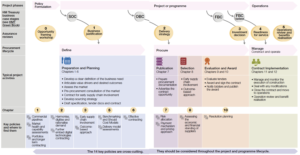The Construction Playbook (by Transport for London) sets out key policies and guidance for how public works projects and programs are assessed, procured, and delivered. The Construction Playbook captures commercial best practices and specific sector reforms outlining the government’s expectations of how contracting authorities and suppliers, including the supply chain, should engage with each other.
These are set out in 14 key policies for how the government should assess, procure and deliver public works projects and programs which all central government departments and their arms-length bodies are expected to follow on a ‘comply or explain’ basis.
The Playbook sets out what the London government will expect (and will contract for) from industry, including continuous improvement in building and workplace safety, cost, speed and quality of delivery, greater sharing of better data, investment in training the future workforce through upskilling and apprenticeships, and adoption of the UK BIM Framework. To support this, suppliers should pass the principles and policies set out in this Playbook down through the supply chain.
Early supply chain involvement
Public works projects and programs should contract for early supply chain involvement (ESI) to achieve the planned outcomes and value for money. Investing time in ESI can lead to more effective designs, reducing changes and potential cost increases downstream. This results in faster delivery when construction starts.
ESI extends the principle of early contractor involvement by formally engaging the tier 1 contractor alongside tier 2 and 3 sub‐contractors and suppliers in the pre-construction phase to input into the design (including the use of standards for products and interfaces), costing, risk management, and structuring of a project or program.
Good ESI relies on strong leadership, project governance including strong commercial management, and suitably qualified practitioners to ensure that proposals are clearly understood and limited to what is required to enable successful project delivery. Trust is key and it is important that a mutually beneficial, open, and collaborative approach is adopted during the process of sharing ideas and innovative solutions. A transparent approach that clearly sets out all parties’ intentions and ways of working should be adopted.
The procurement process, evaluation approach, and contract should generally be structured to cover both the ESI and the construction phase. While it is possible to follow ESI with a further competitive procurement process, this can undermine the benefits of using ESI. Future procurements and frameworks should support this with the development of a market and supply chain that can develop and deliver designs based on these platform approaches, manufacture and supply components, and innovate to improve and develop these over time.
Source: TfL

